- Home
- Laura Resnick
Fever Dreams Page 15
Fever Dreams Read online
Page 15
Another lively argument was prevented by the sudden opening of the car door. A Seguridore told them in gruff Spanish that they could go now. Eager to do so, they left behind Madeleine's ruined stockings and an empty bottle of cognac as souvenirs for Escalante, and slid out into the humid night air. The crowd had grown even bigger, and several cameramen were present. Martinez was immediately recognized, and several journalists descended upon him.
“Let's find Miguel,” Ransom suggested, steering Madeleine in the opposite direction. “He must be somewhere around here.”
Sure enough, he was. They found him twenty minutes later, searching frantically for them, terribly apologetic about having been late, and relieved to see them alive and well.
“Let's just get out of here, Miguel,” Ransom suggested.
“Where's the car?” Madeleine asked wearily.
“Over there. I was late because of the First Lady,” Miguel explained, leading the way to where he had left the limo. “She wanted to go shopping one more time before she would let me leave this evening.”
CHAPTER TEN
Madeleine awoke after a restless and largely sleepless night to discover that things could, indeed, always get worse. She was groggy, stiff, sore, and very cranky. She phoned her lawyers and bankers, explaining she would need updated copies of everything they had done yesterday. They promised to see to it immediately, but when she and Ransom arrived at their offices, she found that absolutely nothing had been done since her phone call. She didn't get back to the Presidential Palace until lunchtime.
Another surprise awaited them there. President Veracruz, moved beyond words by Ransom's reported heroism, hosted a huge impromptu luncheon in his honor, affectionately chastising Ransom for not having informed him himself of last night's events. Escalante attended the luncheon, remaining stone-faced throughout the ordeal; but if looks could have killed ... Madeleine repressed a shudder. The effort of being courteous throughout this affair made Madeleine's head hurt, although Ransom's grim expression of forbearance when Veracruz kissed him on both cheeks was something she'd remember with amusement for as long as she lived.
They had returned to the Palace around ten o'clock last night and quietly retreated to their rooms. Madeleine had immediately phoned her father to explain the evening's events to him, forestalling his concern in case he should learn from other sources of her involvement in the affair. He was most impressed with Ransom's performance, and she had to agree that her father had chosen her bodyguard wisely.
She then soaked her abused body in a hot bath, but she was unable to sleep afterwards. The realization that she had nearly died tonight kept her wide awake, as did her muddled analysis of her increasingly uncharacteristic behavior. The day's events now overwhelmed her, and she wanted to seek out Ransom, though she was a little fuzzy about what exactly she wanted from him. Not sex. Not tonight. Exhausted and sore and contemplating her own mortality, she didn't feel remotely passionate. But she wanted his company, his comfort, his offhanded common sense and his ironic humor. She just wanted to be with him. And that realization kept her tossing restlessly for most of the night.
One look at Ransom today, however, left her in no doubt that he had slept like a baby last night, damn him. And his relaxed good humor only irritated her as the day wore on.
When the formal luncheon was finally, mercifully over, Madeleine hoped they could leave for the ranch at last. They were already six hours behind schedule. Veracruz then informed her, however, that only a presidential car was good enough to drive a hero like Ransom into the rugged Montedoran countryside. Consequently, the President's secretary had cancelled Madeleine's reservation for a rental car and was sending Miguel and a limousine to the ranch with her.
Madeleine ground her teeth together and tried to talk her way out of it while Ransom watched, obviously amused by her efforts. She insisted that she didn't want to take advantage of the President, to inconvenience his employees, or to inconvenience Senora Veracruz by monopolizing her driver. The President's enigmatic response to this last sally made Madeleine suspect that he knew exactly what the First Lady and her driver were doing on those ‘shopping trips’ and intended to put a stop to it.
Madeleine made a few more attempts to elude Veracruz's unwanted generosity, including pointing out that she had reserved a rugged vehicle from the rental agency for practical reasons; the limousine was not suited to Montedora's rural roads and might even be damaged.
When the President's obstinacy began to turn into annoyance, Madeleine gave up and thanked him for his generosity. They still couldn't leave, however. Upon receiving his instructions this morning, Miguel had gone to see his family, and he still wasn't back. By the time he finally showed up, Madeleine felt ready to hop up and down with agitation, though she was sure that no one except Ransom realized this. And he, damn him, continued to find it rather amusing. She said a courteous goodbye to her hosts, then waited with painfully concealed impatience for Ransom to finish taking his leave of them.
“I am very excited, senorita,” Miguel explained as he finished putting her luggage in the trunk of the car. “I have only been out of Montedora City once before.” He opened the car door for her.
“Then this will be an adventure for you.” She tried to smile at him, remembering her discussion with Ransom. A young man of Miguel's natural talents had so few opportunities here.
They pulled away from the imposing white Palace and rolled down the sweeping driveway. Ransom collected his guns at the front gate, and Miguel steered the car down the Western Highway, heading into the vast Calentura Valley which lay between Montedora's two major mountain chains. Whatever lay ahead, Madeleine was relieved to finally leave behind the Presidential Palace and its scheming inhabitants. Now she knew why Ransom didn't relish staying there.
“Veracruz is right, you know,” Ransom commented, lighting up a cigarette. “We'll never make the ranch by nightfall.”
“Can you at least open a window if you're going to smoke that thing?” she snapped.
“And there are no Holiday Inns here,” he continued mildly, rolling down his window.
“I'm aware of that. I have been here before.” Her bad manners and lack of self-control actually seemed to please him, she noted grumpily. Men.
“Then I assume you have a plan?”
“Of course I have a plan. I always have a plan.”
“That's what I thought.”
“Doragua, a town of reasonable size, lies about two-thirds of the way to the ranch. Since the roads are unsafe after dark—”
“And not so safe by day,” Ransom remarked.
“—we will stop there for the night. There is an inn there, the only inn for forty miles in any direction.”
“I'll tell Miguel.”
“I already told him while the First Lady of Montedora was draping herself around your body in poignant farewell.”
“She likes me.”
His complacent tone made her want to bite his head off. Her stomach burned from the once-a-week anti-malarial pill she had taken before lunch. Her head hurt; so did the scrapes and cuts on her legs and feet. She felt like she was falling apart, inside and out.
Veracruz had had the car fully provisioned for their journey: food, beverages, magazines, pillows, and toilet paper (even if they saw a toilet between here and Doragua, it was unlikely to have toilet paper which, like everything else, had become prohibitively expensive due to Montedora's 312% inflation). Ransom picked up one of the pillows, put it on his lap, and patted it invitingly.
Madeleine gave him the frostiest look of inquiry she could muster. It made him grin.
“Come on,” he said. “Lie down and take a nap. You're tired and cranky. If you get any meaner, I'll have to tie you to the roof of the car.”
To her surprise, she laughed. “I'm sorry.” Her apology was rueful; he had really hit the nail on the head.
He put a hand on her neck and massaged gently. It felt too heavenly to resist, and she closed her eyes, lettin
g him knead her taut muscles.
“You're as tight as a drum,” he chided. “Relax a little.”
“No, I...” She felt blood flow into her cramped shoulders and sighed. “I should review my paperwork and ... and...”
“Come on. Lie down.” He brushed her hair away from her face and added, “I promise I'll behave.”
She glanced at him. “Behave?” she repeated doubtfully.
“Uh-huh.”
The warm expression in those changeable green eyes was at odds with his words, but she nonetheless believed him. She had already realized that he was not a man who promised anything lightly. Her pride and her sense of propriety urged her to refuse his offer, but suddenly the gentle pressure of his hand was too enticing to resist, and she let him guide her head to the pillow on his lap.
“Kick off your shoes,” he urged, shifting to settle her more comfortably.
She did as he suggested, then drew her feet up onto the seat, comfortably curling up as he stroked her hair.
“Better?” he asked softly.
“Better,” she murmured, feeling safe and contented. He was right. She needed sleep. She needed ... She sighed again and closed her eyes, enjoying the soothing gentleness of his touch.
* * * *
The flat fields around the capital city gradually gave way to the foothills of the mountains where, long ago, the Spanish conquistadores had found rich veins of gold. They had enslaved the indigenous people of the region and set up vast labor camps of men, women, and children to work their gold mines, build and tend their villas, and haul their plunder through thick, perilous jungles on the long journey to the coast. For over a century, their galleons had carried the wealth of the New World home to Spain, the overloaded ships so slow and unmaneuverable that they were easy prey for the pirates of the Caribbean. There were other dangers on the long voyage, too; before reaching the Atlantic, well over a thousand treasure-laden ships floundered and sank in the violent hurricanes and treacherous reefs of the Florida Straits. But the rape of the Americas continued unabated.
When the mountain gold for which Montedora was named finally ran out, the country turned to agriculture. All the forests from Montedora City eastward were cut down for timber, and vast plantations took their place. The mountains to the west remained largely wild, untamed, and underpopulated to this very day. El Rancho Barrington was in the Calentura Valley, the vast agricultural lowland lying between Montedora's two major mountain chains. Las Verdes—the Green Mountains—south of the ranch had been a haven for bandits ever since the days of the conquistadores. To the north were Las Lunas, the Mountains of the Moon, and the stronghold of the Dorista rebels. Ransom looked down at his sleeping companion and was appalled that she had made this journey alone only six months ago.
The lack of direct access to the sea had kept the country isolated. Unskilled labor and corrupt leaders had kept it poor, as had its long history of warfare. Ten years ago, Montedora had gone to war with one of its neighbors over the disputed results of an international soccer game; the conflict had bankrupted the already impoverished society. One had to actually see the poverty here to understand how thorough and overwhelming it was. The average income in the USA was almost three hundred times the average income in Montedora, where 3% of the people held 97% of the wealth. It wasn't surprising that a kid like Miguel, born to a poor Montedoran family, now drove a car for a living, slept with a middle-aged woman for extra tips and presents, and had only been outside of Montedora City once in his life; no, the surprising thing was that he had managed to get even this far in life. Ransom wondered if he'd ever have the chance to get any farther.
The country's first military coup, some seven years ago, had initially given Montedorans hope for a better future. They were promised schools, medical services, and jobs, as well as elections for the first time in nearly thirty years. However, rival military factions were soon vying for power and sabotaging each other's efforts to affect change. The new government was overthrown a year later by a violently oppressive right-wing regime. Then, three years ago, that junta was overthrown by the then immensely popular Veracruz and his supporters (the most forceful of whom had been the immensely unpopular General Escalante).
Although Veracruz's administration was less oppressive than his predecessor's, Escalante, using his new private security army, the Seguridores, had instigated a reign of terror which Veracruz seemed unable to control. Meanwhile, the corruption and excesses of the government continued unabated, and the population grew ever more discontent and restless. Another revolution seemed imminent, a popular one this time, led and backed by the long-suffering people of Montedora. The only people who had nothing left to lose, Ransom thought again, as the President's limo passed through a small, ramshackle village.
Though Veracruz was a greedy fool with no interest in the plight of his people, he was no worse than any of his predecessors of the past forty years. Indeed, Ransom sadly acknowledged, Veracruz was probably the best of the lot, mostly because his own popularity meant a great deal to him. He was more and more distressed by his growing unpopularity, and the assassination attempts of the past year seemed to hurt his pride even more than they frightened him. And he certainly knew that the murderous intrigues of Escalante and the Seguridores, who were loyal solely to Escalante himself, were a major factor in the Montedoran people's growing hatred for Veracruz.
Yes, Ransom thought, Martinez was probably telling the truth. In order to salvage the love of the masses, Veracruz would get rid of Escalante, the man who had put him in power. Clever, ruthless, uncharismatic and almost universally disliked, Escalante had undoubtedly known, three years ago, that the country would never accept him as a ruler, no matter how much he wanted the job for himself. So he had chosen Veracruz, a popular public figure with a certain shallow charm and a gift for pleasing the crowd, to be his puppet. Escalante had counted on always being able to manipulate Veracruz. It seemed, however, that his confidence had been misplaced. Veracruz deeply resented how his own position was endangered by Escalante's bloodthirsty excesses.
Ransom himself had been the instrument of Veracruz's first major defiance of Escalante's wishes. Ransom could still remember the fury with which Escalante had received the news that he and the Seguridores, like everyone else, would be disarmed at the Palace gates from now on. For Ransom, it had been a common-sense measure. With no knowledge of or influence over how the Seguridores were chosen and trained, he considered them an unknown quantity who should not be trusted with weapons in a secure area. But Escalante had taken it personally. Very personally. Ransom fully believed that, if he could have gotten away with it, Escalante would have had him killed then. But an American passport and a close association with Veracruz had kept Ransom relatively safe, the arrest and brief imprisonment being Escalante's only revenge. And that had been bad enough.
“Ah, well, that's why I make the big bucks,” Ransom muttered to himself, stroking the blonde head resting against his flat stomach.
He silently wished Veracruz luck. Getting rid of Escalante would be like trying to pull the fangs out of an angry rattlesnake.
Turning his thoughts in a more pleasant direction, he studied Madeleine's sleeping face. He often forgot, in encountering the force and complexity of her personality, how very beautiful she was. Now, as she slept, the sheer loveliness of her fine-boned features and alabaster skin made him catch his breath. Moonspun hair fell in a silken tangle as he brushed it away from her face, and her firm, round breasts rose and fell with her deep, even breathing. She wore comfortable, stylishly simple clothes for the journey: loose linen trousers with a sleeveless top of some pale color he couldn't define. And she hadn't bothered to use make-up to conceal the circles under her eyes today.
He wondered what had ruined her sleep last night. He'd been so exhausted that nothing on earth could have kept him awake, and he'd awoken this morning feeling rested and buoyant. There was something very satisfying, after all, about knowing you had saved people's lives. He'd e
xperienced it once before, during his days in the Service: the certain, indisputable knowledge that, except for him, someone would have died violently. And once the danger was over, there was no feeling to beat it. Whatever he did tomorrow, or next year, or thirty years from now, he had already done something that guaranteed his life wasn't wasted. Despite his failings and sins—and they were legion—he believed that when his number finally came up, he could look his Maker in the eye and say that for at least one moment, he had mattered, he had made a difference. And he felt damn good about that.
He supposed last night's tumultuous events had been what kept Madeleine awake. She had been such a trooper. Except for impulsively leaving her hiding place and following him into the street, she had kept her head and done everything right. He still didn't think she fully realized how much she had endangered them both with that reckless act. Focused and clear-headed as he took aim against the terrorists, he had experienced a moment of overwhelming panic when he saw her running toward him. Fear for her had flooded him, paralyzing him for a precious, dangerous second, a second in which he could have lost her forever. He still felt sick and chilled to the bone when he thought of it. She had surprised him, true, but he shouldn't have lost control like that in such a dangerous situation, not even for a second. It wasn't like him.
He'd been so angry with her afterwards that he'd left bruises on her arms where he'd grabbed her. He could see them now. He touched them with regret. Still, when the smoke cleared, he was gratified by the emotions which had prompted her crazy behavior, just as he was gratified by the way she returned his ruthless, life-affirming kiss. Whether she liked it or not, Madeleine cared about him. He'd have felt smug—if he didn't feel so vulnerable.
Jesus, why had she left him like that at the Hotel Tigre? Would she do it again, knowing him as she did now? Hell, why didn't he just ask her?
Because he'd feel like a fool, that's why. She had a fiance to fill her nights in New York. She had tried to discourage Ransom's advances even in her softer moments down here. She had told him how much she loathed being the recipient of uninvited sexual advances. What more did he need to convince him that, even if she had started to care about him a bit, she didn't want to get involved with him?

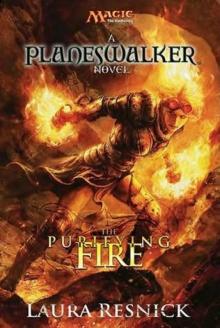 The Purifying Fire p-2
The Purifying Fire p-2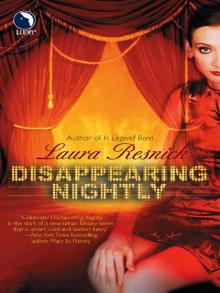 Disappearing Nightly
Disappearing Nightly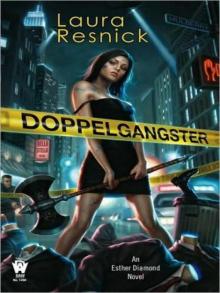 Doppelgangster
Doppelgangster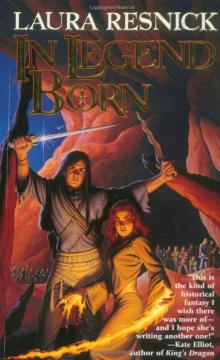 In Legend Born
In Legend Born The Destroyer Goddess
The Destroyer Goddess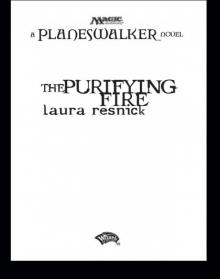 The Purifying Fire: A Planeswalker Novel
The Purifying Fire: A Planeswalker Novel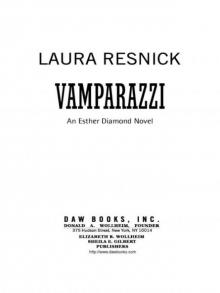 Vamparazzi
Vamparazzi A Wilder Name
A Wilder Name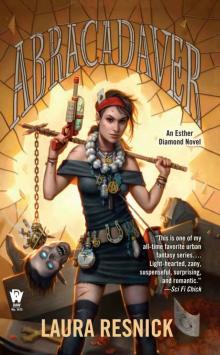 Abracadaver (Esther Diamond Novel)
Abracadaver (Esther Diamond Novel)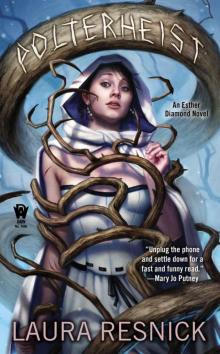 Polterheist: An Esther Diamond Novel
Polterheist: An Esther Diamond Novel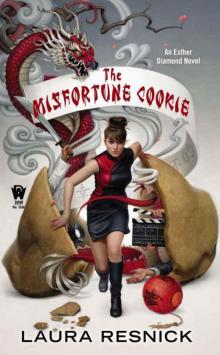 The Misfortune Cookie ed-6
The Misfortune Cookie ed-6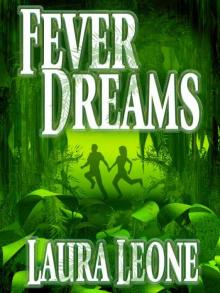 Fever Dreams
Fever Dreams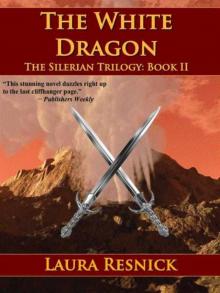 The White Dragon
The White Dragon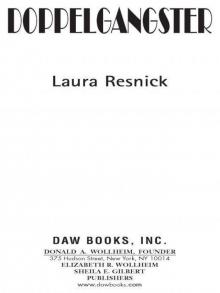 Dopplegangster
Dopplegangster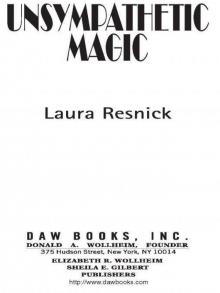 Unsympathetic Magic
Unsympathetic Magic